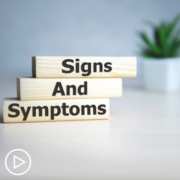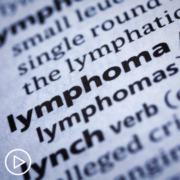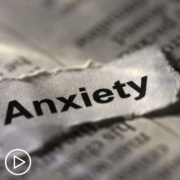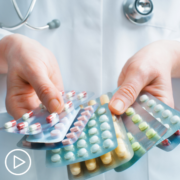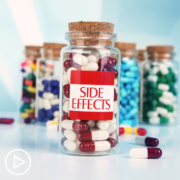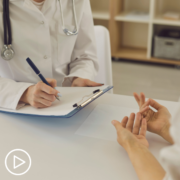Should CLL Patients Worry About Enlarged Lymph Nodes?
Should CLL Patients Worry About Enlarged Lymph Nodes? from Patient Empowerment Network on Vimeo.
Should chronic lymphocytic leukemia (CLL) patients be concerned about enlarged lymph nodes? Expert Dr. Ryan Jacobs shares his perspective on when his patients start treatment due to lymph node enlargement and additional symptoms that become concerning.
Dr. Ryan Jacobs is a hematologist/oncologist specializing in chronic lymphocytic leukemia from Levine Cancer Institute. Learn more about Dr. Jacobs.
Related Programs:
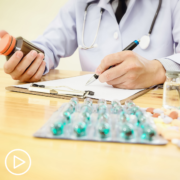
Can CLL Remission Occur With Rheumatoid Arthritis Drug Treatments? |
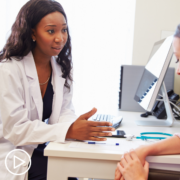
|
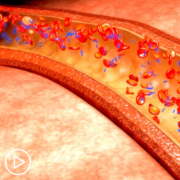
|
Transcript:
Lisa Hatfield:
So this patient is asking, “When you are in the watch-and-wait phase and are feeling lymph nodes getting bigger, when is it appropriate to contact your oncologist?”
Dr. Jacobs:
This is a question that comes out a lot with my CLL patients. It’s a very subjective thing. Lymph node pain, that’s what’s supposed to trigger needing treatment for CLL from a lymph node standpoint. Technically speaking, if there’s a lymph node bigger than 10 centimeters, we’re supposed to start treatment. That’s one of the criteria too. That’s one that I almost never see, because usually patients get uncomfortable with their lymph nodes or their disease progresses elsewhere significantly before a lymph node gets that big.
So discomfort or pain, and that’s up to the patient, and I tell them like, “You have to tell me if this is bad enough that you want to start treatment.” And I have patients that are very different in how they interpret that. And I’ve got some patients that have visibly enlarged neck nodes and have had it for a while, and they don’t feel like they’re bothered by them, even though they’re quite chunky.
And then I have patients that have had lymph nodes that aren’t that big that really bother them. And so we start treatments. It’s just a very subjective thing. The only part I would identify is, you don’t need to just call your oncologist if you’re just noticing a little bit of growth or a node here and there, that’s expected. If you’re on active surveillance, it is expected that over time most patients’ white count will go up. Not all, most patients’ lymph nodes will grow. Not all.
The reason I would call an oncologist to maybe schedule earlier follow-up is if there’s accelerated growth that’s persistent and maybe if it’s associated with new symptoms like feeling really badly, fevers, waking up drenched in sweat. These are all signs that maybe the lymphoma has transformed to a more aggressive type of lymphoma that’s called Richter’s transformation. So that’s when I would be concerned. But low level chronic growth that’s relatively asymptomatic, is not overly concerning.
Lisa Hatfield:
Hey, as a blood cancer patient, the limited duration treatment sounds like a dream. So this patient is asking, is there a time-limited pill-only treatment regimen yet, or is one in the pipeline?
Dr. Jacobs:
If you live in Europe, ibrutinib (Imbruvica) and venetoclax (Venclexta) got approved. I did a lot of research on that study. The FDA didn’t look as favorably on the comparison arms of the trials that led to the approval in the EU. So we do not have FDA approval. It is on the NCCN guidelines, as an option in…or as another option, that you can consider. The research is ongoing into getting the venetoclax combination approved with the newer BTK inhibitors. I currently am putting a lot of patients on a trial that’s looking at acalabrutinib and venetoclax. So I do think we will have, for some patients, the option, that for some patients that want it, and that seem to fit the, what we ultimately decide is the best patient population for this combination, the option to give a combination of pills for a time-defined period.
Share Your Feedback
Create your own user feedback survey

